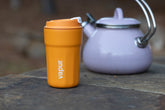The serene, peaceful feeling you get when you’re on a long hike can make you forget that it’s actually a high-level workout.
You’re burning more than 400 calories per hour on an average hike, usually over multiple hours. That means if you don’t fuel your body properly during your hike, your body will suffer.
In this article we’ll give you everything you need to know to keep your body in top condition on a hike, so that you can focus on the beautiful nature around you.
Potential Issues During a Hike
Let’s first see what can go wrong with your body on a long and difficult hike, so we know what issues our diet needs to be geared towards preventing.
Overheating
When you burn energy, your body temperature rises. That’s why you might see steam coming off your skin when you go for an early morning run on a cold day.
Maintaining a high energy output over multiple hours, as you do on a hike, carries a very real risk of overheating, and further issues that come along with it.
Dehydration
You’re also going to sweat a lot. Even if you’re not dripping with sweat right away, over the course of your hike you’ll end up losing a lot of fluids, as well as certain vitamins and nutrients that leave the body via sweat.
Low blood sugar
Your body will primarily use glucose (aka blood sugar) stored within the body for energy during your hike.
After an extended time, your blood sugar stores can become low. Even if you’re not diabetic, you’ll need to carefully manage your blood sugar to ensure it doesn’t drop too low.
Muscle aches
A hike is also very taxing on the muscles, particularly as you go up and downhill. A bit of muscle soreness is almost guaranteed. It can be even worse if you don’t give your muscles the fuel they need to repair and rebuild on the go.
Best Drinks and Snacks for a Successful Hike
For a multi-hour hike, you’re going to need some kind of drinks and snacks along the way to provide sustenance. Here are five things to pack for your next hike to help.
Trail Mix
Trail mix is one of the best healthy snacks you’ll find, and is perfectly suited for a long hike.
You can customize it with pretty much anything you like, but generally a trail mix is going to contain a mixture of nuts, seeds, dried fruits and sometimes dark chocolate.
These ingredients deliver a great dose of carbs, healthy fats and protein, providing sustenance for your hike, in a nutrient-dense, low-calorie form that won’t have you feeling bloated if you eat a lot.
Electrolytes drink
One of the biggest risks during a hike, and one of the easiest to ignore, is dehydration.
Not only will you sweat and lose fluids, you’re also going to lose important vitamins, minerals and nutrients, known as electrolytes.
You’ll need to consistently rehydrate with a clean electrolytes powder like Nakedade, which not only provides key electrolytes but also has carbohydrates to keep your energy and blood sugar up.
Fruits
Fruits are one of the best natural sources of sugar, which provide the energy you need during your hike.
They’re light and easy to eat on the go, and keep your blood sugar high enough, yet don't spike your blood sugar like some artificial sugary snacks do.
Bananas are particularly good for a hike, with a high amount of natural sugar, fiber for sustained energy production, and potassium (one of the body’s key electrolytes) to replace what you’ll lose in your sweat.
Protein bars
Don’t forget protein. It’s not as important for energy as carbs or fats, but protein is essential to give your muscles fuel to repair and rebuild themselves.
Protein bars are easy to eat on the go and are extremely dense in protein, giving you the building blocks you need to avoid intense muscle pain the day after your hike.
Water
Finally, simple water should be a part of your hiking kit. You’ll need to drink a lot of fluids to replace what you lose over the course of your hike, so make sure you have ample water alongside the snacks above.
Pre Hike Snack
While you’ll definitely need to fuel yourself during the hike, your pre-hike nutrition is important too.
You need to start off with the right food to maximize energy production and have your body in top shape from the first step into nature.
There are a couple of things you want from your pre-hike meal or snack.
First, you’ll want something similar to what we discussed above. Carbs and fats for energy production, protein for muscle repair and recovery, and high fluid and electrolyte levels.
The better fueled you are before your hike, the less you need to take with you on the way.
However, be careful not to overeat. You don’t want to have a completely full stomach when you start your hike. This will make things uncomfortable, and you’ll be dealing with gastric issues that will be no fun.
So go for a light, clean meal with nutrient-dense foods that aren’t too heavy.
Combine this with good intra-hike nutrition and you’ll be free to enjoy the hike to the fullest.


